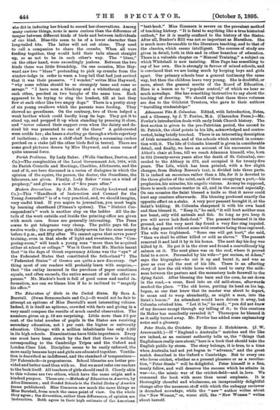The Education of Girls in the United States. By Sara
A. Burstall. (Swan Sonnenschein and Co.)—It would not be fair to attempt an epitome of Miss Burstall's most interesting volume. Indeed, it is itself an epitome, crowded with facts and giving in a very small compass the results of much careful observation. The numbers given on p. 19 are surprising. Little more than 2.5 per cent. of the total number of pupils in the States are receiving secondary education, not 1 per cent, the higher or university education. Chicago with a million inhabitants has only 4.200 in its high schools. Examinations have little importance. Every one must have been struck by the fact that there is nothing corresponding to the Cambridge Ttipos and the Oxford and London Class List. Discipline seems to be easily enforced, the more easily because boys and girls are educated together. Ventila- tion is described as indifferent, and the standard of temperature- 70° Fahrenheit—is preposterous. School libraries are better pro- vided and better used than with us. But we must refer our readers to the book itself. All teachers of girls should read it. Closely akin to this volume are two others, which have the same origin and a kindred purpose. These are :—Methods of Education in America, by Alice Zimmern ; and Graded Schools in the United States of America (same publishers). Miss Zinn:Dern saw much the same things as Miss Btu-stall, from much the same point of view. On the whole they agree ; the diversities, rather than differences, of opinion are instructive. Both agree in their high estimate of the American
"text-book." Miss Zimmern is severe on the prevalent method of teaching history. "It is fatal to anything like a true historical outlook," for it is mostly confined to the history of the States. After all, Bunker's Hill was not so important as Marathon. She is much more favourable to the literature teaching, and to that of the classics, which seems intelligent. The courses of study are given in detail, both in this and in other branches of education. There is a valuable chapter on "Manual Training," a subject on which Whitehall is now insisting. Miss Page has something to say of her own. She is strongly in favour of mixed schools, and is convinced that we are losing much by keeping boys and girls apart. Our primary schools bear a general testimony the same way, but then the children leave very young. She is doubtful, or more, about the general merits of the Board of Education. ' Here is a lesson as to "popular control," of which we hear so much nowadays. She has something instructive to say about the teaching of drawing. We should say that these three volumes are due to the Gilchrist Trustees, who gave to their authors "travelling studentships."






































 Previous page
Previous page